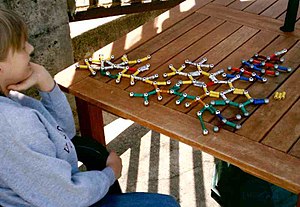Asperger's syndrome
| Asperger syndrome | |
|---|---|
| Synonyms | Asperger's syndrome, Asperger disorder (AD), Asperger's |
 |
|
| Restricted interests or repetitive behaviors, such as this boy's interest in playing with a toy model of molecules, may be features of Asperger's. | |
| Classification and external resources | |
| Specialty | Psychiatry |
| ICD-10 | F84.5 |
| ICD-9-CM | 299.80 |
| OMIM | 608638 |
| DiseasesDB | 31268 |
| MedlinePlus | 001549 |
| eMedicine | ped/147 |
| Patient UK | Asperger syndrome |
| MeSH | F03.550.325.100 |
Asperger syndrome (AS), also known as Asperger's, is a developmental disorder characterized by significant difficulties in social interaction and nonverbal communication, along with restricted and repetitive patterns of behavior and interests. As a milder autism spectrum disorder (ASD), it differs from other ASDs by relatively normal language and intelligence. Although not required for diagnosis, physical clumsiness and unusual use of language are common. Signs usually begin before two years old and typically last for a person's entire life.
The exact cause of Asperger's is unknown. While it is probably partly inherited, the underlying genetics have not been determined conclusively. Environmental factors are also believed to play a role.Brain imaging has not identified a common underlying problem. The diagnosis of Asperger's was removed in the 2013 fifth edition of the Diagnostic and Statistical Manual of Mental Disorders (DSM-5), and people with these symptoms are now included within the autism spectrum disorder along with autism and pervasive developmental disorder not otherwise specified. It remains within the tenth edition of the International Classification of Diseases (ICD-10) as of 2015.
There is no single treatment, and the effectiveness of particular interventions is supported by only limited data. Treatment is aimed at improving poor communication skills, obsessive or repetitive routines, and physical clumsiness. Interventions may include social skills training, cognitive behavioral therapy, physical therapy, speech therapy, parent training, and medications for associated problems such as mood or anxiety. Most children improve as they grow up, but social and communication difficulties usually persist. Some researchers and people on the autism spectrum have advocated a shift in attitudes toward the view that autism spectrum disorder is a difference, rather than a disease that must be treated or cured.
...
Wikipedia
